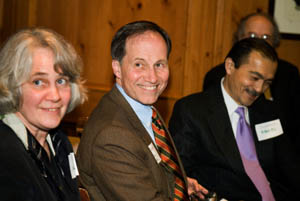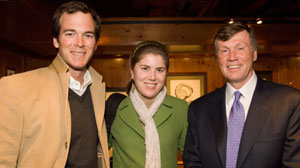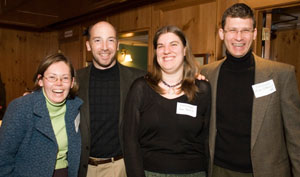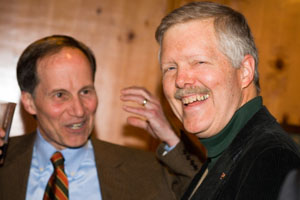As a chilly rain soaked the streets during evening rush hour on Wednesday, April 4, members and friends of the Dartmouth Club of Greater Boston, four College trustees, and a half-dozen students filled a downstairs room at McCormick and Schmick's restaurant with warm conversation and a palpable avid interest in Dartmouth.
The informal get-together, organized by club presidents Andy Horne '87 and Andrea Lordan '86, gave Boston-area alumni and trustees—Nancy Kepes-Jeton '76, Ed Haldeman '70, Michael Chu '68, and Al Mulley Jr. '70—a chance to mingle over cocktails and, pulling chairs together, to talk “as neighbors, co-workers, and parents,” said Horne. He invited the trustees to “share anything you'd like people to know more about” with regard to themselves, life at Dartmouth, College and alumni governance issues, the work of the board, and the election now underway for a trustee to replace Jeton, whose term ends in June. He urged alumni to ask questions about anything that mattered to them.

Horne billed the evening as letting people “bypass the rhetoric of newspaper articles, blogs, and election mailings,” and some comments were so compelling, you could've heard a pin drop in the room. But others probably weren't new to anyone who's followed the Dartmouth governance debate in recent months and read the views of the administration, many members of the board and Alumni Council, and some other alumni volunteers and students on the Web and in the Dartmouth, Boston Globe, and other newspapers.
In a comment that would strike anyone but a Dartmouth alumnus as remarkable, Haldeman declared that today's Dartmouth students “are not just intellectuals.” He visits campus frequently, he said, “as the dad of an '08 and an '03, and I can tell you, the student community is unbelievably thriving and vibrant.” Referring to recent claims, he said, “Some students are laughing at the mythology out there that there's been a big change since the 1960s in who Dartmouth students are, that they're not well rounded.” Haldeman cited the high levels of Greek participation, new dorms in the McLaughlin cluster, and great popularity of the new fitness center in Alumni Gym, and prompted smiles with references to the student pig roasts he's attended.
Jeton asked how many people in the room had already voted in the trustee election, and about a half-dozen hands went up. Acknowledging that it's not easy to sort through the press and mailings about the candidates—Sandy Alderson '69, Sherri Oberg '82, '86Tu, Stephen Smith '88, and John Wolf '70—Jeton said that in judging any trustee candidate's qualifications, she asks several questions.
“First, do they really understand what a trustee does? A trustee's role is governance, not management, of the College,” she said. “This is a very, very important distinction. Governing means getting your head around the issues the College faces, not getting your hands into them.” Mulley repeated this with regard specifically to academics.

Another question Jeton asks is, “Do the candidates describe a Dartmouth I recognize?” Referring to Booz Allen's recent classification of Dartmouth College and Oxford University as the world's most enduring educational institutions, Moody's AAA rating of the College's financial strength, and widely reported surveys showing that 90 percent of students are positive about their Dartmouth experience, Jeton said that portrayals of Dartmouth as struggling with student dissatisfaction are strikingly at odds with her experience on campus.
“And how do they form their view of Dartmouth? Do they have a history of engagement with the College? Have they been involved with their class or club, given to the Alumni Fund, done enrollment interviewing? Being involved—that is a requirement.”
Finally, Jeton asks, “Can this person be entrusted with the selection of Dartmouth's next president? Is this person someone who's not just steeped in yesterday, but can anticipate the needs of the College tomorrow?”

How elusive this ability can be was apparent during Chu's characterization of the role of the board of trustees as “collective deliberation,” not “partisan representation.”
We're in a crisis of governance right now,” said Chu. “Not because there are people on the board with different views. We've always spanned the spectrum, as you'd expect of any group, from the most conservative to most liberal. What is a matter of concern is that there are different views of what a trustee does.”
In Chu's view, “the role of the trustees is to discern what is best for Dartmouth. I don't mean my opinion of what is best for Dartmouth, but rather what the board members work together to determine is in the best interests of Dartmouth. I have to guard myself against my strongest convictions in working as a board member to reach a majority opinion.”
An opposing view, said Chu, “is that you're elected to the board to represent a subset of people who elected you and represent one partisan view.” This has the board working more like Congress, he said.
“Dartmouth is a jewel in our civilization,” said Chu. “It's much stronger than this crisis. But the time we might lose in this conflict does trouble me.”
The conversation clearly interested the alumni in the room. Though they represented classes from the 1940s to 2006 and a range of participation in DCGB, class, and campus activities, from nonstop to none at all, everyone seemed interested in understanding the governance questions prompted by the current trustee election and last fall's alumni constitution vote. “Why did the constitution need to be changed? It wasn't really clear to me,” said Jim Hughes'64, '66Th, '66Tu. He'd already voted in the trustee election, Hughes said.
“I'm not well informed,” said Brendan O'Day '91. “We don't get up to Hanover. We have three kids. But we're voting. We got the ballot mailings, and when I heard the trustees were going to be here, I thought I should come by.”

My main interests are education and governance,” said Steve Cheheyl '67, who serves on the Dartmouth Computing Advisory Group. “I was away, and I've got a pile of governance-related mail waiting for me at home that I'm going to read.” Did he have a specific question he wanted to ask the trustees? “I'm just here to listen,” said Cheheyl. “I went to one of the trustees' breakfasts last year and found it interesting.”
Bob Blake '65 took notes during the entire discussion. “I see a lot of information out there, and people saying one thing and then another that seems contradictory. I might share some of this with them. But I often take notes, even during sermons. For me,” said Blake, “the main issue is that alumni serve and support the students and the faculty of today.”
One of those students, Chris Bertrand '07, who was among the six Hill Winds Society members who traveled from Hanover through the wintry storm to attend the event, said, “I had the opportunity to meet some of the trustees, and I was heartened—if admittedly a bit surprised—to see how plugged in they are to what is going on on campus. I was psyched to see how interested they are in talking with students about what is really relevant to us.”
